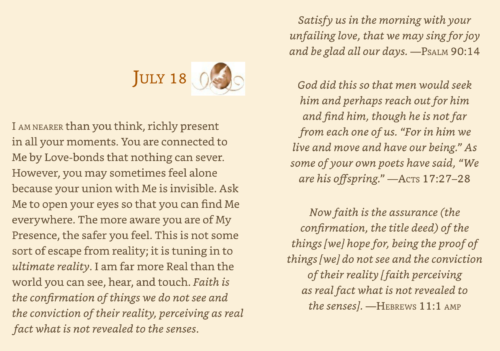Christ Is Everywhere
Father Richard begins his book The Universal Christ by quoting English mystic Caryll Houselander (1901–1954), who experienced Christ in the faces of people around her while riding the subway and walking through London. From that mystical experience, she knew:
Christ is everywhere; in [Christ] every kind of life has a meaning and has an influence on every other kind of life. It is not the foolish sinner like myself, running about the world with reprobates and feeling magnanimous, who comes closest to them and brings them healing; it is the contemplative in her cell who has never set eyes on them, but in whom Christ fasts and prays for them—or it may be a charwoman in whom Christ makes Himself a servant again, or a [ruler] whose crown of gold hides a crown of thorns. Realization of our oneness in Christ is the only cure for human loneliness. For me, too, it is the only ultimate meaning of life, the only thing that gives meaning and purpose to every life. [1]
Father Richard continues:
The question for me—and for us—is: Who is this “Christ” that Caryll Houselander saw permeating and radiating from all her fellow passengers? Christ for her was clearly not only Jesus of Nazareth but something much more immense, even cosmic, in significance. I believe this vision, once encountered, has power to radically alter what we believe, how we see others and relate to them, our sense of how big God might be, and our understanding of what the Creator is doing in our world.
A cosmic notion of the Christ competes with and excludes no one, but includes everyone and everything (Acts 10:15, 34). In this understanding of Christianity’s message, the Creator’s love and presence are grounded in the created world, and any mental distinction between “natural” and “supernatural” falls apart.
When I know that the world around me is both the hiding place and the revelation place of God, I can no longer maintain a significant distance between the natural and the supernatural, between the holy and the profane. (A divine “voice” makes this exactly clear to a very resistant Peter in Acts 10.) Everything I see and know is indeed one “universe” that revolves around one coherent center. This Divine Presence seeks connection and communion, not separation or division—except for the sake of an even deeper future union.
What a difference this makes in the way we walk through the world, in how we encounter every person in the course of a day! It is as though everything that seemed disappointing and “fallen,” all the major pushbacks against the flow of history, can now be seen as one whole movement, still enchanted and made use of by God’s love. All of it must somehow be usable and filled with potency, even the things that appear as betrayals or crucifixions.
God Is the Beloved
This week’s Daily Meditations feature writings of twentieth-century women mystics. Each one shares her experience of God as unconditional and unsurpassed love from her unique background. Father Richard Rohr believes this is true for all mystics:
People who know God well—mystics, hermits, those who risk everything to find God—always meet a lover, not a dictator. God is never found as an abusive father or a tyrannical mother; God is always a lover greater than we dared hope for. How different from the “account manager” most people seem to worship. God is the lover who receives and forgives everything.
When we go into the Presence, we find someone not against us, but someone who is definitely for us! Mystics recognize someone else is holding them. People who pray always say, “Someone is for me more than I am for myself.” Prayer is being loved at a deep, sweet level. I hope everyone has felt such intimacy alone with God. I promise it is available to all. Maybe a lot of us just need to be told that this is what we should expect and seek. We’re afraid to ask for it; we’re afraid to seek. It feels presumptuous. We can’t trust that such a love exists. But it does.
Father Richard has found great inspiration over the past several years in the writings of Jewish mystic Etty Hillesum (1914–1943). In her letters from the Westerbork transit camp, Hillesum describes the solace she finds in God’s continual presence:
You have made me so rich, oh God, please let me share out Your beauty with open hands. My life has become an uninterrupted dialogue with You, oh God, one great dialogue. Sometimes when I stand in some corner of the camp, my feet planted on Your earth, my eyes raised toward Your heaven, tears sometimes run down my face, tears of deep emotion and gratitude. At night, too, when I lie in my bed and rest in You, oh God, tears of gratitude run down my face, and that is my prayer. I have been terribly tired for several days, but that too will pass. Things come and go in a deeper rhythm, and people must be taught to listen; it is the most important thing we have to learn in this life. I am not challenging You, oh God, my life is one great dialogue with You. I may never become the great artist I would really like to be, but I am already secure in You, God. Sometimes I try my hand at turning out small profundities and uncertain short stories, but I always end up with just one single word: God. And that says everything, and there is no need for anything more. And all my creative powers are translated into inner dialogues with You. The beat of my heart has grown deeper, more active, and yet more peaceful, and it is as if I were all the time storing up inner riches. [1]
